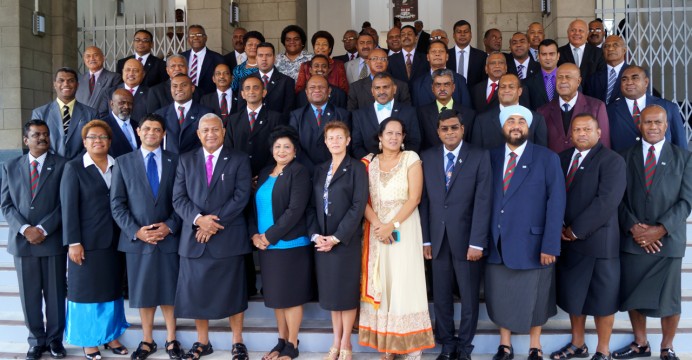
Dr Steven Ratuva
ANALYSIS: One of the most reassuring sights in recent years was the group photo of parliamentarians in front of Fiji’s new Parliament building, standing shoulder to shoulder, with smiles glittering in the dry Suva sun.
These were the successful ones, those whose parties collected more than 5 percent of the votes and who were allocated seats according to their respective intra-party rankings.
SODELPA fought a hard and enterprising battle but fell far short of victory. They were disadvantaged from the beginning by their ethno-nationalist ideological and political strategy aimed fundamentally at mobilising the Taukei who made up 297,818 (60 percent) of the total votes of 496,364.
This meant that they had to win at least 247,188 (83 percent) of Taukei votes to be able to win 25 seats (50 percent), the minimum threshold for any party to claim victory.
SODELPA versus Fiji First
Instead, SODELPA won 139,857 votes which translated into 47 percent of the total Taukei votes. But assuming that some Indo-Fijians and minorities voted for SODELPA also, the figure could come down a bit to around 46 percent Taukei votes.
This meant that about 54 percent of the Taukei votes were cast in favour of Fiji First and the other minor parties. This clear division in Taukei votes is reflective of the shifting nature of Taukei interests, expectations and political choices in a fast changing social, economic and political environment. This is a significant lesson for electoral strategising in the next election for political parties who hope to win Taukei votes.
In contrast, Fiji First had a lower level of difficulty because it had a more trans-ethnic appeal and thus only needed at least 50 percent of Taukei votes, 50 percent of Indo-Fijian votes and 50 percent of minority votes to win the 25 seats threshold. Their overwhelming 59.17 percent victory consisted of about 50 percent Taukei (the other 4 percent would have gone to minor parties) together with more than 70 percent of Indo-Fijian and more than 80 percent of minority group votes.
This work is licensed under a Creative Commons Attribution-NonCommercial 3.0 New Zealand Licence.




